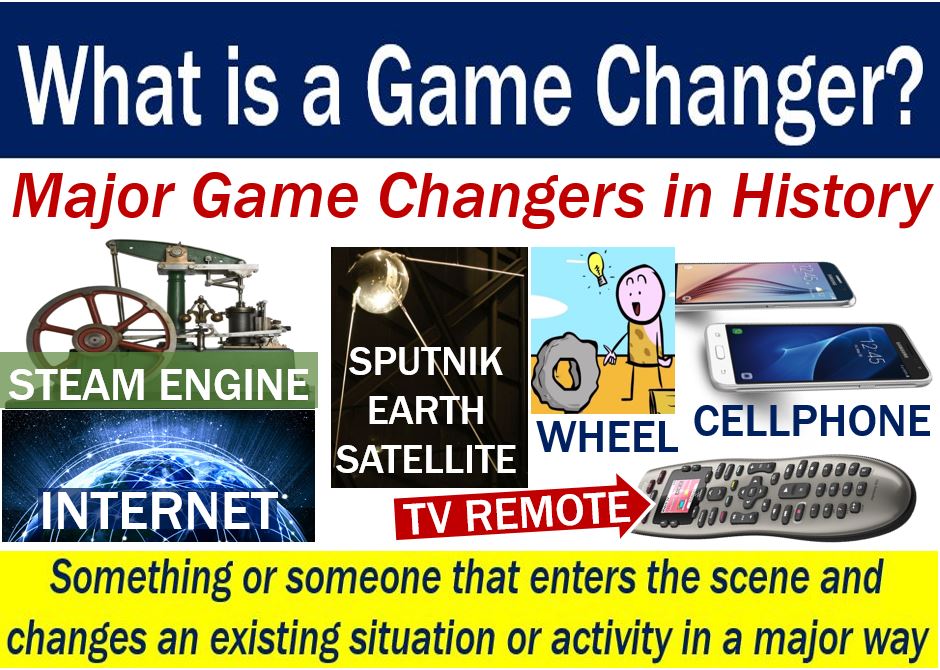A Game Changer is a new factor that changes the variables in an environment or activity. It is a new element that alters the existing situation or activity considerably. For example, the invention of the steam engine was a game changer in transportation, mining, agriculture, and manufacturing. In other words, the steam engine changed how people traveled, farmed, mined, and made things.
In sports, such as soccer (British English: football), a game changer is somebody who comes into a match and changes everything. Perhaps the team was losing, but when John, a substitute, came in, the team drew and then began to win.
According to BusinessDictionary.com, a game changer is:
“A person or idea that transforms the accepted rules, processes, strategies, and management of business functions. Typically leads a movement of related businesses in the same direction.
Radar, a game changer in World War II
Scottish physicist Robert Watson-Watt (1892-1973) developed radar technology that provided British forces with crucial early warnings of approaching German aircraft during World War II.
This technological edge contributed significantly to the UK’s victory in the Battle of Britain (10 July — 31 October 1940), marking Germany’s first major defeat. Radar was a game changer.
A game changer – the Internet 1
The Internet began to spread rapidly in the 1990s. In the world of business, especially retail, it has been a major game changer.
The whole retail landscape has changed since the 1990s. Online retail giant Amazon.com did not exist before 1994. The dominant shops and stores, in those days, consisted of physical buildings. Until about twenty-five years ago, online shopping did not exist.
Today, Amazon.com is one of the world’s largest companies in the retail sector.

Companies that did not adapt to the online world did not survive. Wikipedia has a list of hundreds of retailers in the United States that went out of business. Most of Wikipedia’s list consists of companies that went out of business after the Internet emerged.
A game changer – the Internet 2
Not only has the Internet changed how we do business, but it has also transformed our everyday lives. In fact, it has turned human existence upside down.
The Internet has revolutionized how we communicate with one another. Today, communicating online is the preferred medium.
We use the Internet for almost everything we do, including shopping, watching movies and shows, and getting the latest news.
Most young people and many adults go online for their leisure time entertainment. We even do a major proportion of our meal delivery ordering online.
People today get reminders about their doctor’s appointment on their smartphones. Smartphone communication means that street demonstrations can be organized rapidly.
There have been many cases since the year 2000 of protesting crowds suddenly emerging in the streets. At first, the police were surprised and unprepared. However, recently, they have learned to adapt to this game changer in the world of law and order.
The Internet has been instrumental in creating new industries and job opportunities, ranging from digital marketing to app development.
Major game changers
Here are the ten most important game changers in human history:
- The Agricultural Revolution (Around 10,000 BC)
Marked the start of farming and permanent settlements, leading to civilization growth. - The Invention of the Wheel (Around 3500 BC)
Enabled advanced transport and was crucial for many civilizations’ technological progress. - The Invention of Writing (Approximately 3200 BC)
Allowed historical record-keeping and knowledge sharing, vital for state governance. - The Industrial Revolution (Began around 1760)
Shifted society to mechanized production, sparking urbanization and technological innovation. - The Printing Press (Invented around 1440)
Revolutionized book production, facilitating widespread literacy and learning. - The Enlightenment (Spanned he late 17th to 18th century)
Advocated reason and individual rights, influencing revolutionary political changes. - The Scientific Revolution (From 16th century to 18th century)
Birthed modern science, altering humanity’s understanding of nature and the universe. - The Discovery of Electricity (Key developments 18th & 19th centuries)
Fundamental for modern innovation, impacting almost all technology sectors. - The Internet (Developed in the 1960s)
Transformed global communication, information access, and business practices. - The Development of Vaccines (First vaccine 1796)
Pioneered disease prevention, greatly improving global health and longevity.
Educational Video – What is a Game Changer?
This video presentation, from our YouTube partner channel – Marketing Business Network, explains what the term ‘Game Changer’ means using simple and easy-to-understand language and examples.
